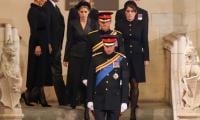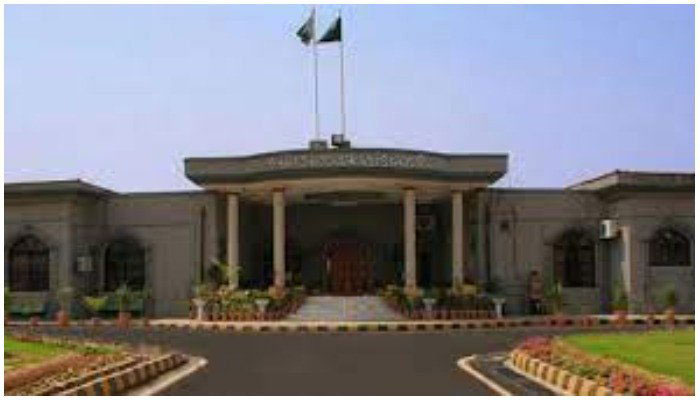Contempt of court case: Amici curiae ask IHC not to indict Jang Group journalists
ISLAMABAD: The amici curiae in a high-profile contempt of court case were unanimous in their opinion when they told the Islamabad High Court (IHC) Friday there was no need to initiate criminal proceedings against the three Jang Group journalists.
They, however, opined that contempt proceedings could be made against the former head of the Gilgit-Baltistan Chief Court. On Friday, Editor ‘The News’ Aamir Ghauri, Editor Investigations Ansar Abbasi as well as former GB chief judge Rana Shamim were present in the courtroom.
On the query about Editor-in-Chief Jang Group Mir Shakil-ur-Rahman’s presence, the court was informed that Rahman was in self-quarantine after a few members of his family tested positive for coronavirus following a recent family function.
IHC Chief Justice Athar Minallah deferred until January 20 framing of contempt charges against the named contemnors and said they could “reflect” on their respective stances. He also commented that accepting of mistake “in front of the court increases honour”.
Amicus Curiae Faisal Siddiqui opposed the indictment of journalists and contended that the intention of the reporter was not to obstruct the administration of justice or commit contempt. He submitted that publishing a story irresponsibly did not warrant criminal contempt proceedings against a person, adding that reckless publication were not a contempt of court.
He submitted that it would become a precedent for framing charges against a reckless publication. “Had the journalists any intent of obstructing the administration of justice, it would have been contempt,” Siddiqui said, adding that reckless publication could never be a contempt of court.
In case of Rana Shamim, he had intended to obstruct the administration of justice and made a criminal contempt, hence he should be proceeded against in accordance with law and he should be indicted,” Siddiqui submitted.
Justice Athar Minallah, however, observed that the stance of the contemnors was so categorical and they still insist they were right in publishing the story about the affidavit. He said still there was no remorse.
Siddiqui said: “I am just against indicting journalists [...] take a look at Firdous Ashiq Awan’s contempt case; Awan was involved in contempt of court and every media channel aired [her press conference]. Even in that case, no proceedings were carried out against the media.”
At this, the IHC CJ said the issue is with Abbasi's stance as he asked the journalist to show him any judgement that might suggest that the court issued orders under influence. Wrapping up his submission, Siddiqui said: “I oppose framing of charges against the media but not Rana Shamim.”
Similarly, Attorney General for Pakistan (AGP) Khalid Javed submitted before the court that Rana Muhammad Shamim was the principal person responsible for maligning the judiciary and obstructing the administration of justice, while the media was the secondary party.
“I am not talking about politics, but a narrative is being built that is affecting this institution,” the AGP submitted. "A perception is being created for quite a while. I can say that the person creating this perception is not present in the court,” he said but did not elaborate who that person was.
The attorney general submitted that in no way should the trial be affected, no matter who was at fault, adding that in case journalist Abbasi received an affidavit in future he would make sure to investigate it further. He said that as Ansar Abbasi said that if it was just a statement, he would not have published it or if it was a lie, he should also have not published it. “If today Ansar Abbasi or Aamir Ghauri may receive another affidavit, then they will first look into it,” the AGP added.
Khalid Javed told the court that contemnor Rana Shamim be proceeded against and he should be indicted, adding that he would be given a fair trial in accordance with law. The AGP submitted that indictment of journalist might be delayed, but they should remain present during the court proceedings. He said that if Mir Shakil-ur-Rahman could not come due to Covid, then he could be asked to join the proceedings through video-link. Chief Justice Athar Minallah, however, said that Rahman would have to appear before the court.
The IHC CJ then asked Aamir Ghauri as to when would Mir Shakil-ur-Rahman be able to attend the court proceedings. Ghauri replied that Rahman was in self-quarantine for at least ten days and requested the next date should be fixed accordingly.
The court’s amicus curiae Reema Omer was also called to the rostrum to weigh in on the case. She said that if contempt of court did take place, it was on the part of he who recorded his statement in the affidavit. She said that the matter pertains not only to the freedom of expression but also to the right of access to information.
Omer noted that when the news first broke, the affidavit also did the rounds on social media, but the news story made no mention of the Islamabad High Court or any judge. She lauded the court’s efforts to ensure freedom of expression remains intact in Pakistan.
The legal expert said that it is the duty of a journalist to exercise reasonable care before publishing a story. She noted that Abbasi had included Saqib Nisar’s stance in his story and that overall reasonable care had been exercised in the story’s publication. She said that there was no precedent for the media being blamed for publishing a story regarding a statement that a party continues to stand by.
Omer said a judge of the same court, Shauqat Aziz Siddiqui, had levelled several serious allegations against the court that were reported by media all over Pakistan. “In that case, a judge was put under scrutiny, but no action was taken against the media,” she said.
The IHC chief justice asked whether the narrative that a bench was formed to delay the verdict at someone’s behest should be considered true. “Are you suspecting that this court’s benches are formed at someone’s behest?” he asked. “Not at all. I am not suggesting such a thing at all,” Omer replied.
The amicus curiae was then asked to take a seat by Justice Minallah and the court called upon Rana Shamim’s lawyer. Abdul Latif Afridi, counsel for Shamim, told the court in a lighter vein that he had come prepared for indictment and forgot his points. He submitted that they were bound both under the Constitution and they were unanimous that they had a great respect and regard for the court.
“We must protect the judiciary, otherwise, the system of administration of justice will collapse,” Afridi contended, adding the world had become a global village hence it was not possible to stop an international organisation from commenting on anything.
“Without knowing the facts,” Justice Athar Minallah interrupted. “Every day some minister or adviser gives a statement which also gets published and aired by TV channels,” Latif Afridi submitted. “Leave the journalists and indict my client as it was very difficult to face this whole community (media),” Afridi told Justice Minallah in a lighter vein adding that since one of the suspects was not present in the court, charges should not be framed.
Ansar Abbasi told the IHC CJ that he took care while publishing the affidavit and did not name the judge in the story. Earlier, at the outset of the hearing, IHC Chief Justice Athar Minallah told Ansar Abbasi that the court had received his plea of a clerical error in the order. “Tell me, what clerical error is there in the order?,” Justice Minallah asked the journalist.
Ansar Abbasi replied that in the order, the court had quoted him as saying that even if a claim was wrong, he would publish it public interest. Responding to the journalist, the IHC CJ said, “In your application, you yourself had written that you were not aware whether his [Shamim’s] claim against Nisar was true or not.”
The judge asked Abbasi whether he would publish an affidavit solely on the basis of a prominent personality handing it to him. “The prevalent narrative is that Saqib Nisar had influenced a judge in a case. However, the said judge was not even part of the bench [which tried Nawaz and Maryam].”
“Justice Mohsin Akhtar Kiyani, Justice Miangul Hassan Aurangzeb and I were part of that bench [...] and [in the light of the news story], it seems like we had been influenced,” he said. “If an inquiry is held, it will take place against the judges who were part of the bench,” Justice Minallah said. The IHC CJ told Abbasi that throughout the entire proceedings, he had tried to make him realise what he had done. “Take a look at past newspapers and see what you have published.”
“The story was published two days before appeals in the case were to be heard,” he pointed out. At this, Abbasi said Shamim would have to answer to the court regarding his affidavit. Insisting that he had followed journalistic principles, Abbasi said he had published the former GB judge's claim along with Nisar's rebuttal. The IHC CJ said he respected the right to freedom of expression and that he did not care about the criticism directed towards him.
“Nobody knows about the importance of the on-going case in the court. Sometimes things are done unintentionally; this is the second contempt of court case I am hearing in my judicial career,” the IHC CJ observed.
He also told Abbasi that his case was sub judice, yet he was still publishing statements from international institutions.“Did not you know as to who could be affected through this affidavit,” the IHC chief justice asked Abbasi, adding that was also in violation of the sub judice rules.
At this, the journalist said he believed that the court should not frame charges. “You will not decide this, the court will; you cannot dictate the court,” Justice Minallah said.
Nasir Zaidi, another amicus curiae and Secretary General of Pakistan Federal Union of Journalists (PFUJ), submitted before the court that the whole society was encircled with darkness while the court was a beacon of light for it. “This court has always given justice to journalists as well,” Zaidi submitted and prayed the court not to frame charges against journalists.
Justice Athar Minallah asked Nasir Zaidi as to whether he had shared with the international media organisations, last order of the court to which he replied that the “court's decision was printed out and the text was circulated across the world”.
The IHC CJ then asked whether he should also appoint a foreign specialist to assist in the case in the given circumstances. At this, Ansar Abbasi told the court they publish several statements, but did not mention whether they are true or not.
Justice Minallah again asked Abbasi if it had not been an affidavit and just a statement, would he have published it?” Abbasi replied in negative. He, however, praised the court for endorsing the freedom of expression and media adding that after the publication of the story, another journalist Zafar Abbas [Editor Dawn] had tweeted that had he received that affidavit, he would have published it.
“It’s good that the journalist did not receive the affidavit; otherwise, he would also have faced contempt,” Justice Minallah replied in a lighter vein. After hearing the arguments, the IHC CJ told the journalist that he was not questioning his credibility, but also said: "Abbasi saheb, I do not doubt your credibility, but you do not realise that you are at fault here." Later, the court adjourned the hearing until January 20.
-
 Christopher Nolan Reveals Why He's A Fan Of 'Fast & Furious' Movies
Christopher Nolan Reveals Why He's A Fan Of 'Fast & Furious' Movies -
 Ben Affleck Unable To Accept A New Lover Post Jennifer Lopez Divorce As He Still Grieves End Of Bennifer 2.0
Ben Affleck Unable To Accept A New Lover Post Jennifer Lopez Divorce As He Still Grieves End Of Bennifer 2.0 -
 Why Is Demi Moore Being Called Ozempic Victim?
Why Is Demi Moore Being Called Ozempic Victim? -
 Kaley Cuoco Makes Honest Comparison Of 'Big Bang Theory' And 'Charmed' Gigs
Kaley Cuoco Makes Honest Comparison Of 'Big Bang Theory' And 'Charmed' Gigs -
 Robert Picardo Shares Surprising Reaction On Returning To The 'Star Trek' Franchise
Robert Picardo Shares Surprising Reaction On Returning To The 'Star Trek' Franchise -
 AI Feud Deepens As Musk Targets OpenAI Over Safety Concerns
AI Feud Deepens As Musk Targets OpenAI Over Safety Concerns -
 'Paranoid' Andrew Fears Assassination: 'Panic Is Spiralling'
'Paranoid' Andrew Fears Assassination: 'Panic Is Spiralling' -
 Israeli Minister Hits Back At Prince Harry
Israeli Minister Hits Back At Prince Harry -
 Thousands Of Google Accounts Could Be Misused By Hackers: Report
Thousands Of Google Accounts Could Be Misused By Hackers: Report -
 Prince Harry Ignores Question About Andrew
Prince Harry Ignores Question About Andrew -
 Ryan Gosling On What Makes 'Star Wars: Starfighter' Different From Other Franchise Films
Ryan Gosling On What Makes 'Star Wars: Starfighter' Different From Other Franchise Films -
 Rumours About 'ambitious' Savannah Guthrie Dismissed
Rumours About 'ambitious' Savannah Guthrie Dismissed -
 Aly Michalka Reveals Why She Turned Down Offer To Star In 'Hannah Montana'
Aly Michalka Reveals Why She Turned Down Offer To Star In 'Hannah Montana' -
 Harry, Meghan Join William, Kate In Distancing Themselves From Beatrice, Eugenie
Harry, Meghan Join William, Kate In Distancing Themselves From Beatrice, Eugenie -
 'View' Co-host Sara Haines Makes Rare Confession About Married Life
'View' Co-host Sara Haines Makes Rare Confession About Married Life -
 Andrew Believes King Charles 'sacrificed' Him To Protect Institution?
Andrew Believes King Charles 'sacrificed' Him To Protect Institution?




